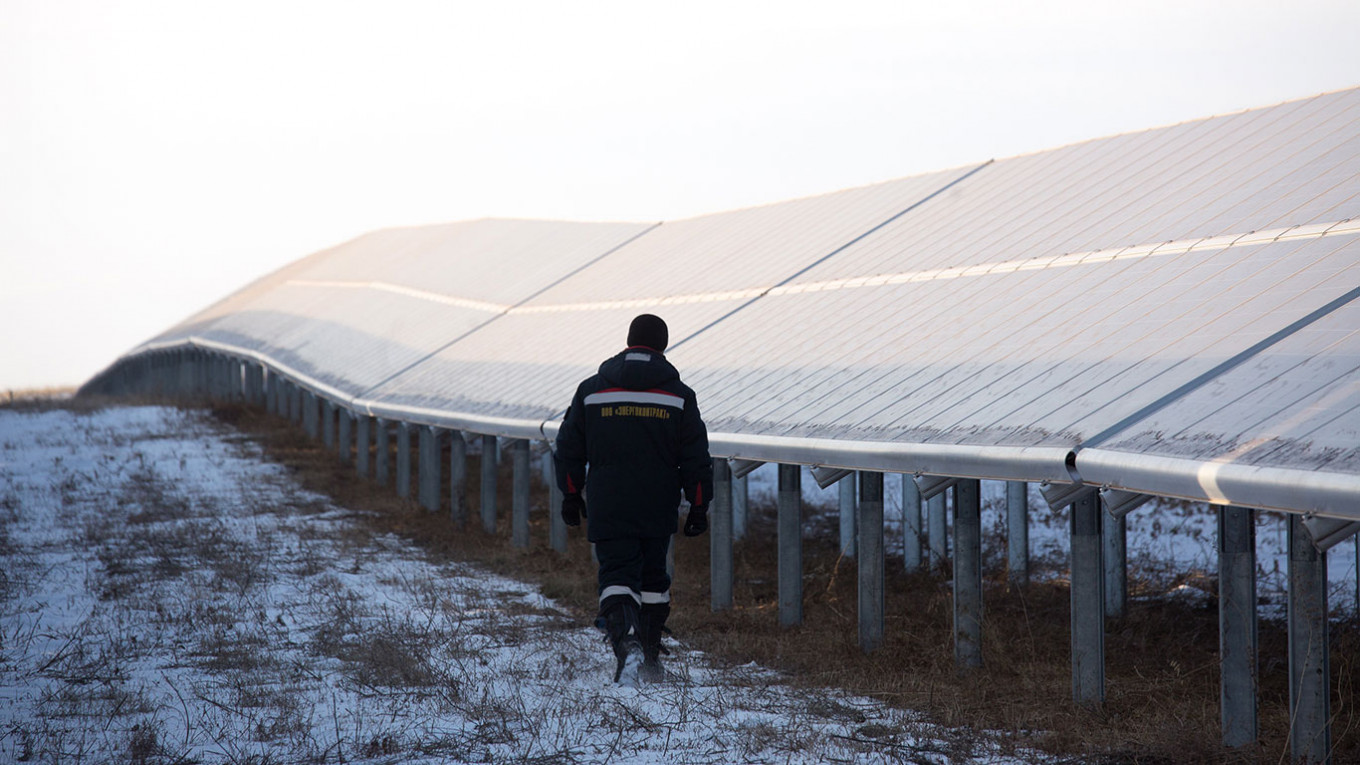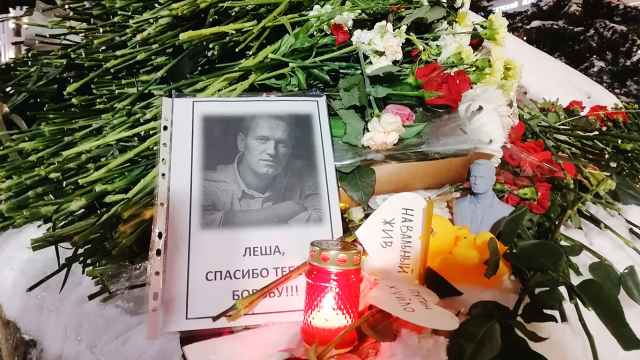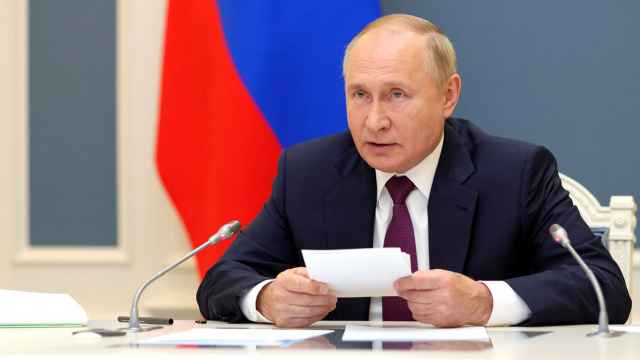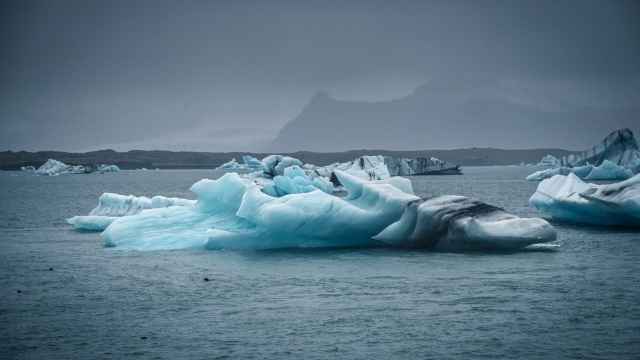Solar energy in Russia might be on the verge of a major expansion, thanks to a government support program for renewable energy sources, industry experts told The Moscow Times.
Russia, the world’s fourth-largest emitter of greenhouse gases, has historically relied on its vast oil and gas reserves to bolster its economy. But the Kremlin has started to pay attention to the global climate emergency, and ahead of this week’s pivotal COP26 climate summit in Glasgow, President Vladimir Putin pledged that Russia would achieve carbon neutrality by 2060.
The second stage of a trillion-ruble ($14.2 billion) support program for renewable sources of energy started in September with the allocation of benefits for projects due to come online in 2025-2035, many of them in the solar industry.
“We have been hearing for a long time that renewable energy is not the right path for Russia, considering our fossil fuel resources and the price of renewable generation, but now this myth has been completely debunked” said Alexei Zhiharev, director of the Russia Renewable Energy Development Association (RREDA).
Solar energy is the renewable most ripe for development, RREDA said, because technology has improved to cut the price of its generation in half to between 4,300 and 6,300 rubles ($62-$92) per megawatt-hour, depending on geography and local competition.
Russia’s typically low temperatures and few sunny days don’t mean it can’t produce solar energy on a significant scale, said Anton Usachev, deputy director of Russia’s largest solar panels company HEVEL.
“It is a very outdated myth that Russia doesn’t have enough sunlight,” Usachev said. “People ask us, ‘Why are you building a solar station in the Ural mountains? There is no sun there!’ Well, our data tells us differently.”
Moscow-based renewables company Unigreen Energy, which has received a government guarantee that it will be paid extra for the power it adds to local grids, said Russia has more than enough insolation — solar radiation hitting an object — to produce solar energy.
“Most Russian regions have high insolation — above 1,000 — the level required to generate energy,” the company said in a statement.
Both Unigreen and HEVEL experts said Russia’s many Arctic settlements could benefit from hybrid solar-diesel power stations that would cut costs and solve supply chain and shortage problems.
“Local authorities could now really cut down their expenses on diesel fuel. But most importantly — people get a 24/7 power supply,” Usachev said, pointing to a project HEVEL recently completed in the frozen Far Eastern Chukotka region.
Arctic cold actually helps preserve solar energy, he added, because solar panels lose less of their captured energy in cold weather. On a clear, sunny day, a solar panel in the Arctic might generate more electricity than its twin in Morocco.
Uphill battle
As the third-largest carbon emitter in human history, Russia faces an uphill battle in its attempts to move from fossil fuels to renewable and other sources of clean energy.
The global economy gets roughly 10% of its power from wind and solar sources, while in Russia, solar’s share is just 0.2%.
The government gives fossil fuel companies trillions of rubles in tax incentives each year, even though they already turn the same amount in profits, according to Greenpeace Russia.
Russia is also one of the world’s biggest exporters of natural gas, coal and oil.
“Oil, gas and parts of the economy adjacent to them account for about 60% of all Russian exports, 40% of federal income and 15% of Russian GDP,” said Ilya Stepanov, a climate economist at Moscow’s Higher School of Economics.
“Renewables support level is disproportionately small, compared to how much support fossil fuel energy gets,” he added, while stressing that climate politics in Russia is becoming more active, and that he expects to see changes in energy competition.
While fossil fuels still form the overwhelming basis of economies, the pandemic highlighted how fragile global supply chains can be in the face of unexpected events.
“Covid showed the whole world how supply chains were damaged because they were dependent on Asian suppliers,” Usachev said. “Now countries like Russia, Saudi Arabia and Turkey are seeing more growth happening in localized solar production.”
As the Kremlin introduces new carbon emissions and air pollution regulations, some regions are starting to look at cutting their dependence on fossil fuels.
The Omsk, Altai and Zabaikalsky regions, the republic of Sakha and other locations in Siberia and Russia’s Far East launched their first solar plants in recent years, according to Tatiana Lanshina, the director of think tank Target Number Seven Association.
However, she added that so far there are no signs of major changes in state energy policy.
“Russian carbon neutrality so far does not include cutting fossil fuels and large-scale transition to solar and wind energy.”
On Oct. 18, Lanshina and other scientists presented a new study at a German Eastern European development forum, claiming that Russia could reach net zero emissions by 2050 if it adopted urgent and far-reaching reforms.
Greenpeace activists recently launched a petition asking the government to adopt a Russian version of the “Green Deal” EU decarbonization program. So far, the Russian government has not responded to the calls.
While Russia has not presented an official updated national climate strategy ahead of COP26, and Putin himself will not attend, Lanshina sees the first signs of a change in attitude.
“The ice has moved,” she said.
A Message from The Moscow Times:
Dear readers,
We are facing unprecedented challenges. Russia's Prosecutor General's Office has designated The Moscow Times as an "undesirable" organization, criminalizing our work and putting our staff at risk of prosecution. This follows our earlier unjust labeling as a "foreign agent."
These actions are direct attempts to silence independent journalism in Russia. The authorities claim our work "discredits the decisions of the Russian leadership." We see things differently: we strive to provide accurate, unbiased reporting on Russia.
We, the journalists of The Moscow Times, refuse to be silenced. But to continue our work, we need your help.
Your support, no matter how small, makes a world of difference. If you can, please support us monthly starting from just $2. It's quick to set up, and every contribution makes a significant impact.
By supporting The Moscow Times, you're defending open, independent journalism in the face of repression. Thank you for standing with us.
Remind me later.







